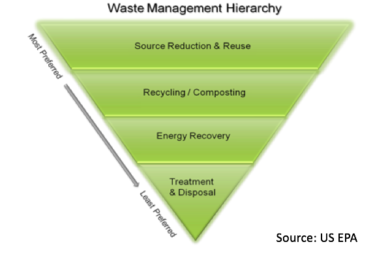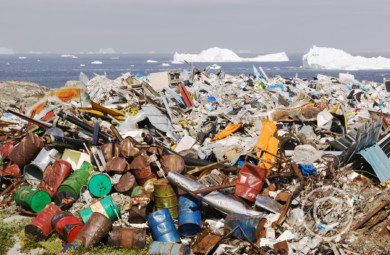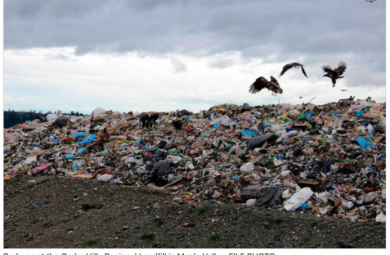
While we favor a circular economy without landfilling or WTE/Incineration the nature of society (and consuming) does create waste that cannot be avoided or recycled. In that case waste should first be made inert, toxics destroyed, and materials and energy recovered so that landfilling, the worst option for dealing with waste, can be avoided by all means possible.
…
In short: Mankind can only exist in the long term with a circular economy. Landfilling means the collapse of our economic system in the long term. Only a circular economy is sustainable. Thermal waste treatment with advanced flue gas cleaning and residue processing is part of a circular economy to optimize (maximize) the material recycling of waste. Note: Energy production is not the focus here (therefore we should part from the term WtE, as it undermines the main purpose of thermal waste treatment), because regenerative energy is available in abundance, you just have to use it.
While we favor a circular economy without landfilling or WTE/Incineration the nature of society (and consuming) does create waste that cannot be avoided or recycled. In that case waste should first be made inert, toxics destroyed, and materials and energy recovered so that landfilling, the worst option for dealing with waste, can be avoided by all means possible.
…
Mankind can only exist in the long term with a circular economy. Landfilling means the collapse of our economic system in the long term. Only a circular economy is sustainable. Thermal waste treatment with advanced flue gas cleaning and residue processing is part of a circular economy to optimize (maximize) the material recycling of waste. Note: Energy production is not the focus here (therefore we should part from the term WtE, as it undermines the main purpose of thermal waste treatment), because regenerative energy is available in abundance, you just have to use it.
Unfortunately, these extreme events, and the conditions they foster – flooding, wildfires, property damage, loss of life – are becoming the new normal, thanks to global warming. And there are other, less obvious but equally damaging, effects as well. As the ocean warms and becomes more saturated with carbon dioxide, fish and other creatures in the marine food chain are adversely affected. Diseases once limited to the tropics are spreading into the temperate zones. Coastlines, from Louisiana to Alaska, are receding, due to more frequent and more powerful storms, rising sea levels, and, in Alaska, the loss of sea ice. The message should be clear: we are running out of time to turn this trend around. Even insurance companies have stopped insuring the homes in particularly affected areas.
…
What can be done now to reduce emissions relatively quickly? The answer is simple: the US must stop landfilling untreated municipal solid waste. A recent (July, 2020) article in the journal Environmental Health and Safety stated that with regard to waste management, “Landfilling is the most greenhouse gas (GHG)-intensive option, emitting nearly 400 kg CO2e per tonne of organic waste…the GHG footprint of landfilling organic waste is higher relative to composting or waste-to-energy by as much as a factor of 9, even when landfill gas is captured and utilized.”

Recently we wrote a letter to President Biden, urging him to consider phasing out landfilling by 2030, to be replaced by an integrated waste management system. Such a measure would make a substantial contribution to methane reductions, and would provide many other environmental and economic benefits. Here is the letter we received in response. While it says in general terms that climate change is serious and that steps must be taken, there is no mention of methane, and no acknowledgement of our proposal, which has been demonstrated to be successful in many European countries. This is just another example of politicians who ask for the public to get involved and then ignore them when they do. It is frustrating and annoying, and explains why people feel compelled to take more drastic measures.

In short, the landfill is the least desirable, and most expensive, means of waste disposal, a holdover from the past that perpetuates the environmental problems of today and creates new ones for the future. The County Council and the SWD have avoided action for far too long, ignoring scientific evidence and economic analyses. But when your only tool is a hammer, every problem looks like a nail.
